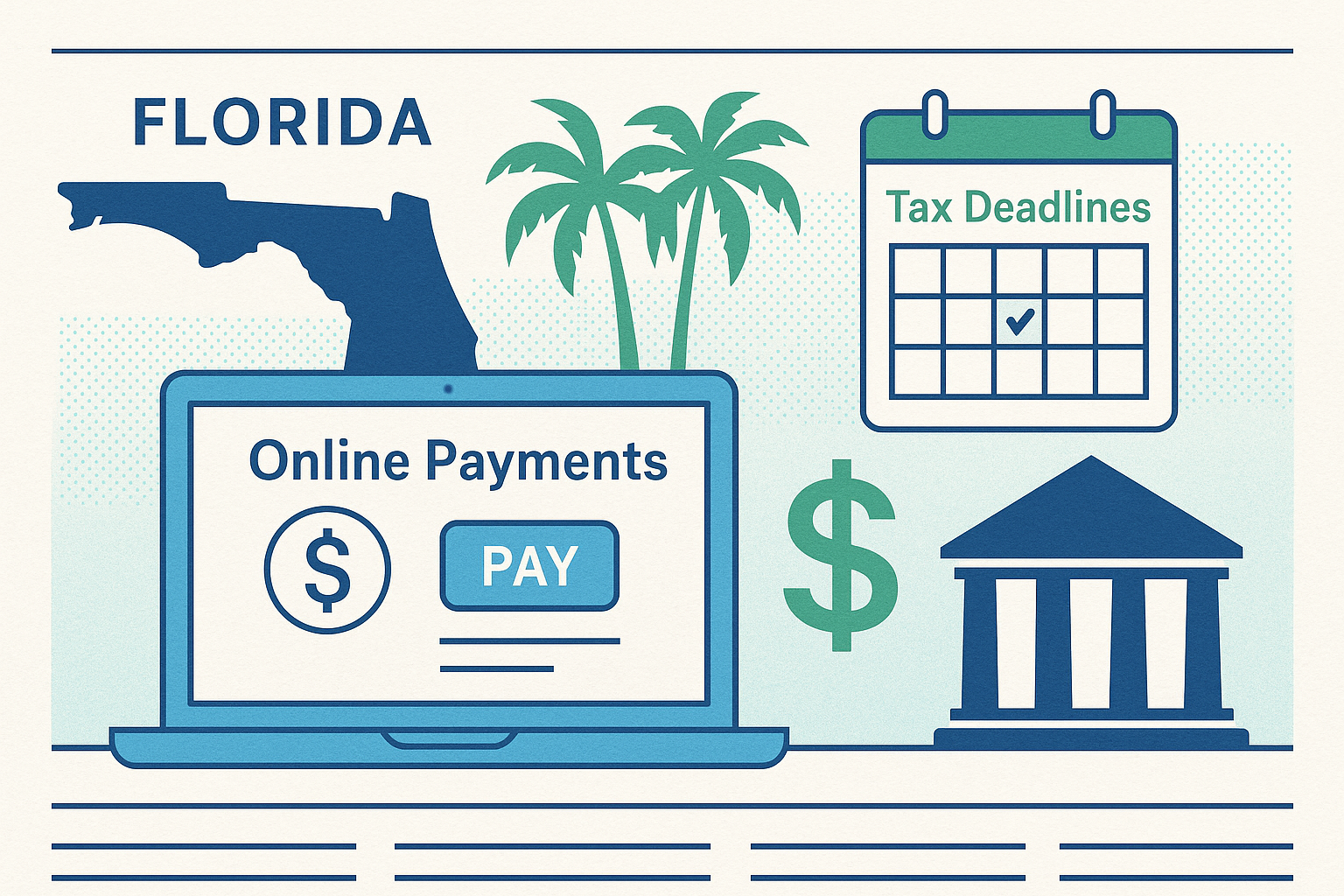
Florida property tax online payments give homeowners, landlords, and businesses a secure way to manage their annual tax bill through county-managed portals. Each county tax collector oversees collections, while the state ensures oversight and uniform standards. Early payment discounts, strict deadlines, and exemptions make timing essential for property owners across the Sunshine State.
Florida property taxes are administered at the county level rather than directly by the state. Each county tax collector’s office is responsible for collecting taxes, issuing tax notices, and offering payment options. The property appraiser establishes every property's assessed value and market value, which together determine the taxable value for the annual tax roll.
Local taxing authorities, including county commissioners, city commissioners, and school boards, set the millage rate that generates the total tax bill for each property. This means a typical homeowner’s liability is determined by three factors: assessed value, exemptions, and the tax rates set by local governments.
The system also covers real estate property taxes, tangible personal property taxes, and non-ad valorem assessments, such as waste collection fees. Revenues fund schools, emergency services, and infrastructure, making property taxes a cornerstone of county budgets.
The property appraiser’s office evaluates property values every January 1. The office considers the home’s assessed value, market value, and any exemptions. The most common relief, the homestead exemption, reduces the taxable value for primary residences, saving many Florida property owners thousands of dollars each tax year.
Other exemptions apply to veterans, seniors, and properties for specific community purposes. Rental property and businesses with equipment in Florida are subject to tangible property taxes that must also be reported annually. These calculations feed into the total estimated taxes shown on each owner’s bill.
All 67 counties offer online payment portals where property owners can pay with a credit card, debit card, or e-check. Payments may also be made at the county tax collector’s office, sent by postal mail, or handled through an escrow account managed by a mortgage company.
Florida law authorizes an installment payment plan, which allows property owners to spread their obligations across four payments per year. The first payment is due in June, and installment payment plan taxpayers must remain current to stay eligible. This option is helpful for businesses or homeowners facing high annual bills.
Some counties, including Pinellas County and Orange County, allow partial payments on real estate taxes. This flexibility helps property owners manage cash flow. Many typical homeowners also rely on escrow accounts, where their mortgage company makes payments directly to the county.
Tax notices are mailed in November, and early payment discounts apply:
All property taxes must be paid by March 31. On April 1, unpaid bills become delinquent taxes. Counties then add interest, advertising costs, and fees. Delinquent property taxes can lead to tax certificates and property loss.
Florida law requires that all property owners know their obligations and pay on time, even if notices are delayed or the escrow account is managed by a mortgage company.
Pinellas County and Orange County illustrate how local systems differ slightly while following statewide rules. Pinellas emphasizes secure electronic options, while Orange County highlights flexibility through installment and in-person payments. In both cases, the county tax collector’s office works closely with the property appraiser’s office to ensure compliance with Florida statutes.
Early payment can save hundreds of dollars each year for a typical homeowner. Businesses managing real estate property taxes and tangible personal property taxes must budget carefully, especially when taxable value runs into the thousands of dollars range.
Those using the installment plan must track each due date, while rental property owners should confirm all charges, including non-ad valorem assessments. Failing to pay can lead to delinquent property taxes, higher costs, and possible foreclosure.
For details, property owners should contact their county tax collector’s office for payment instructions and the property appraiser’s office for exemption questions. Statewide rules and data are available through the Florida Department of Revenue – Property Tax Oversight.
By William Mc Lee, Editor-in-Chief & Tax Expert—Get Tax Relief Now